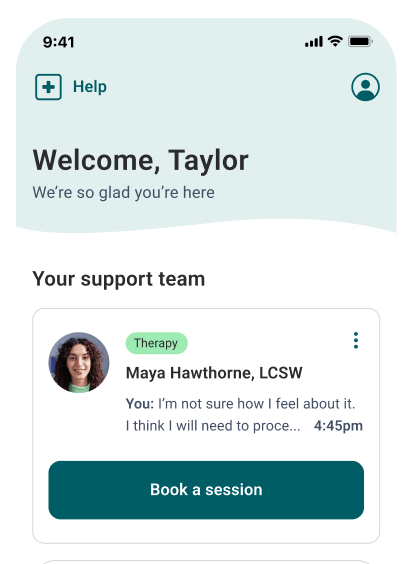Insomnia test
Is it just a messed up sleep schedule or something more keeping you awake? Take our short online sleep insomnia test to find out if you're living with the sleep disorder insomnia.

Youarenotalone
Many people experience difficulty sleeping or an unpredictable sleep pattern. But for more than 50 million adults in the U.S. suffering from insomnia, poor sleep is so frequent that it adds stress and makes things harder in daily life; it can even lead to an anxiety disorder or depression.
Take control of insomnia
When you're up against excessive daytime sleepiness and have difficulty concentrating, things may feel like they'll never change. But you don't have to go through it alone. Our network has thousands of licensed therapists experienced in chronic insomnia treatment and sleep quality issues. We'll match you with a dedicated therapist to help you work through difficult feelings and achieve your mental health goals—all from the privacy of your device.
*Copays represented are averages. Members in high-deductible health plans must satisfy the deductible before copays apply. Check your policy to confirm coverage details.
Your copay could
be as low as
Average copay per session for covered members is
Enter your insurance details to verify your coverage today.
More than 60,000
5-star reviews
Read why people love using Talkspace.
See all reviews
Any questions?
Find trust-worthy answers on all things mental health at Talkspace.

How do doctors test for insomnia?
Your doctor may test for insomnia by asking you to complete a sleep diary to track your sleep patterns. Doctors can also administer sleep disorder tests, including insomnia screening questionnaires, mental health exams, a sleep study or polysomnogram, and a sleep-wake pattern assessment called actigraphy.
Is clinical insomnia a mental illness?
Insomnia is usually not an isolated physical or mental illness. Insomnia is typically a symptom of another condition such as sleep apnea, depression, or anxiety.
In fact, sleep and mental health are closely related. Poor sleep quality affects our mood by disrupting the circadian rhythm and throwing off our normal sleep cycle; it can impact our ability to regulate emotions, make decisions, and ultimately impact our mental health.
Those struggling with depression symptoms often struggle with sleep, whether it be difficulty getting enough or not feeling well-rested (which can lead to daytime sleepiness). People with anxiety tend to experience increased sleep difficulty, which can intensify anxiety symptoms during waking hours. Poor sleep quality can lead to a perpetual cycle that worsens mental health over time.
How do I fix my sleep problem – insomnia?
There are many treatments available for insomnia, including:
- Improving sleep habits
- Cognitive Behavioral Therapy
- Relaxation techniques
- Physical exercise
- Lifestyle changes
- Light therapy
- Medication
- Herbal remedies
Will my insomnia ever go away?
Insomnia can go away or become more manageable with proper treatment and lifestyle changes. By identifying and treating the underlying causes of insomnia, you can find relief.
If you struggle with severe or chronic insomnia, taking an online sleep disorder test can help you identify symptoms within yourself. Share these insights with a professional and collaborate on a specialized treatment plan.
What causes sleep disorders?
Sleep disorders (such as chronic insomnia) can arise for several reasons, including excessive stress, poor sleep hygiene, or mental health conditions. Causes of insomnia can range from environmental issues, atypical sleep schedules, or biological factors that contribute to problematic sleep.
How do I know if I have insomnia?
Sleep disorders like insomnia are challenging conditions that can impact a person's quality of life. Symptoms can include, but are not limited to:
- Problems falling asleep or staying asleep
- Difficulty maintaining restful sleep or getting back to sleep when waking up in the middle of the night
- Experiencing regular sleep disturbances like nightmares, night terrors, or breathing problems
- Daytime sleepiness or fatigue
If you frequently find yourself asking "do I have insomnia," our clinically-backed test acts as a helpful first step to treating your sleep problems, but only a licensed professional can make an official diagnosis. Share your concerns to help them correctly diagnose and develop a treatment plan for you.
Is online therapy an effective treatment option for insomnia?
Online therapy is an effective treatment for insomnia, especially if the causes of your insomnia are the result of stress or another mental health condition. Cognitive Behavioral Therapy for Insomnia (CBT-I) has been shown to improve chronic sleep issues. A therapist trained in CBT can work with you to identify and challenge unhelpful thoughts that are getting in the way of obtaining quality sleep. A therapist will also suggest behavioral techniques to support you in developing good sleep habits.
If you continue to struggle with sleep problems, online cognitive behavioral therapy can help change your life for the better. As you explore your options, know that Talkspace is committed to making mental health care accessible by offering online therapy and psychiatry plans that take insurance.










